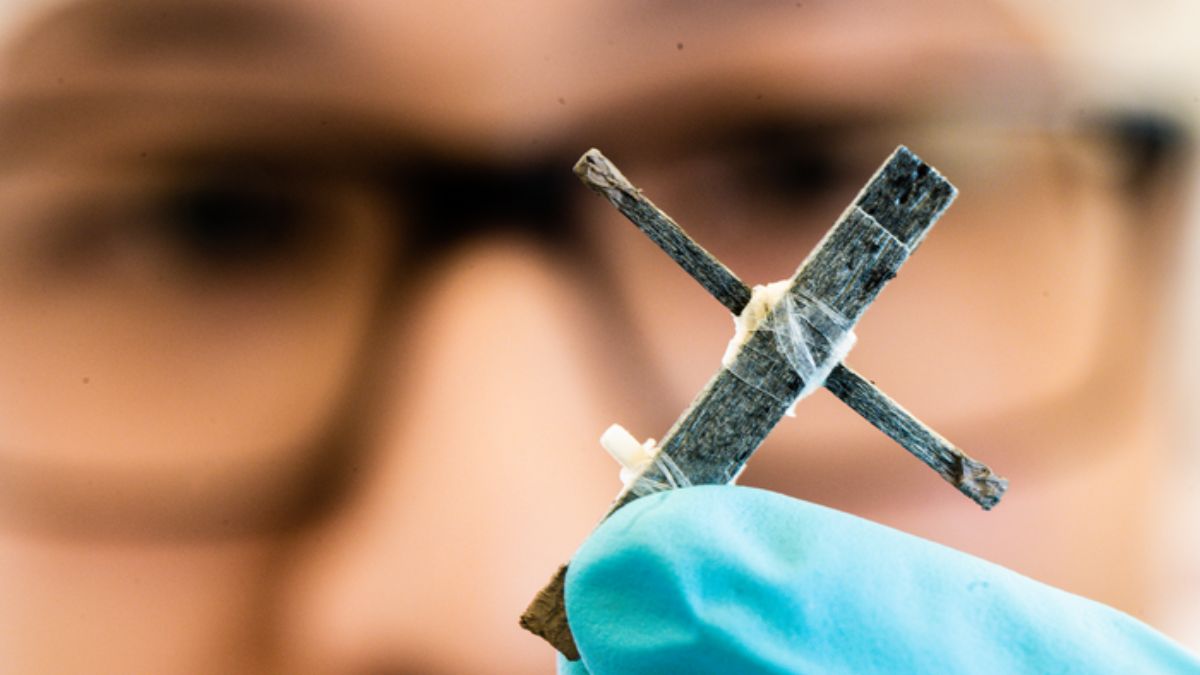
Image credit : Hackster.io ...
news-extra-space

The world’s first wood transistor (Image credit- EurekAlert)
Wood is the newest material to enter the transistor game, so move over to silicon. The world's first wooden transistor was created by scientists from Linköping University and the KTH Royal Institute of Technology. According to an article published in the journal PNAS, researchers from Linköping University and the KTH Royal Institute of Technology have made a significant advancement by developing the first wooden transistor in history. The advancement of wood-based electronics and the management of electronic plants is made possible by this accomplishment. The modest transistor, which was created almost a century ago and serves as a power switch and regulator of electric current flow, is the foundation of contemporary electronics. Wood is now being acknowledged as a viable new material for electronic devices, which is changing the rules of the game. [caption id="" align="aligncenter" width="1200"] Image credit- New Scientist[/caption]
The lignin was meticulously stripped from balsa wood by the researchers, who then filled the channels with PEDOT: PSS, a conductive material. The outcome is a wood material that is electrically conductive and can control electricity flow constantly without degrading.
"We have developed an original principle. Although the wood transistor is slow and large, it does function and has a great deal of room for advancement, according to Isak Engquist, senior associate professor at Linköping University's Laboratory for Organic Electronics.
Although wood-based electronics are still in their infancy, the implications are profound. Regulating electronic plants is one potential application; research in this area is already being done at Linköping University.
The wood transistor has the ability to withstand higher currents than traditional organic transistors because of its bigger channel size. In the future, this characteristic might become essential for particular applications.
[caption id="" align="aligncenter" width="640"]
Image credit- New Scientist[/caption]
The lignin was meticulously stripped from balsa wood by the researchers, who then filled the channels with PEDOT: PSS, a conductive material. The outcome is a wood material that is electrically conductive and can control electricity flow constantly without degrading.
"We have developed an original principle. Although the wood transistor is slow and large, it does function and has a great deal of room for advancement, according to Isak Engquist, senior associate professor at Linköping University's Laboratory for Organic Electronics.
Although wood-based electronics are still in their infancy, the implications are profound. Regulating electronic plants is one potential application; research in this area is already being done at Linköping University.
The wood transistor has the ability to withstand higher currents than traditional organic transistors because of its bigger channel size. In the future, this characteristic might become essential for particular applications.
[caption id="" align="aligncenter" width="640"] Image credit- The Brighter Side of News[/caption]
Electronic plants are those that have electronic systems or gadgets added to them so they can respond to their surroundings and communicate with people or other electronic equipment.
These tools can keep an eye on a plant's well-being, control its growth, and even encourage its natural activities for certain goals like increasing yields or speeding up photosynthesis.
Electronic plants could be developed for use in a variety of industries, including agriculture, environmental monitoring, and possibly energy production.
However, it is important to note that the researchers are not constrained to any one use case. "The wood transistor was not developed with any particular application in mind. Because we could, we did it, Engquist said.
Also read: New Snapdragon 8 Gen 2 powered flagship gaming smartphones, the Asus ROG Phone 7 and 7 Ultimate, are released
This important discovery may open up new avenues for the advancement of wood-based electronics and create a whole new range of opportunities for environmentally friendly and sustainable electronic technology.
In the journal, PNAS, a paper titled "Electrical current modulation in wood electrochemical transistors" appeared.
Image credit- The Brighter Side of News[/caption]
Electronic plants are those that have electronic systems or gadgets added to them so they can respond to their surroundings and communicate with people or other electronic equipment.
These tools can keep an eye on a plant's well-being, control its growth, and even encourage its natural activities for certain goals like increasing yields or speeding up photosynthesis.
Electronic plants could be developed for use in a variety of industries, including agriculture, environmental monitoring, and possibly energy production.
However, it is important to note that the researchers are not constrained to any one use case. "The wood transistor was not developed with any particular application in mind. Because we could, we did it, Engquist said.
Also read: New Snapdragon 8 Gen 2 powered flagship gaming smartphones, the Asus ROG Phone 7 and 7 Ultimate, are released
This important discovery may open up new avenues for the advancement of wood-based electronics and create a whole new range of opportunities for environmentally friendly and sustainable electronic technology.
In the journal, PNAS, a paper titled "Electrical current modulation in wood electrochemical transistors" appeared.
Leave a Reply






